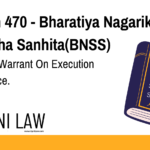1. Code: Exact Text of Section 474 BNSS
The appropriate Government may, without the consent of the person sentenced,
commute—
(a) a sentence of death, for imprisonment for life;
(b) a sentence of imprisonment for life, for imprisonment for a term not less than
seven years;
(c) a sentence of imprisonment for seven years or more, for imprisonment for a
term not less than three years;
(d) a sentence of imprisonment for less than seven years, for fine;
(e) a sentence of rigorous imprisonment, for simple imprisonment for any term
to which that person might have been sentenced.
2. Explanation of Section 474 BNSS
Section 474 of the Bharatiya Nagarik Suraksha Sanhita (BNSS) grants the appropriate Government (Central or State) the authority to reduce or alter a sentence without needing the consent of the convicted person. This legal provision ensures that punishments can be modified based on humanitarian grounds, judicial considerations, or government policies.
Key points of commutation under Section 474 BNSS:
- Death penalty → Life imprisonment
- Life imprisonment → Minimum 7 years imprisonment
- 7 years or more imprisonment → Minimum 3 years imprisonment
- Imprisonment of less than 7 years → Fine
- Rigorous imprisonment → Simple imprisonment
Unlike remission or suspension of a sentence (Section 473 BNSS), commutation permanently alters the punishment to a lesser one.
3. Illustration: Example of Sentence Commutation
Example 1: Death Sentence to Life Imprisonment
Rajesh is convicted of murder and sentenced to death by the trial court. The State Government reviews the case and, considering his good conduct in prison, commutes his sentence from death to life imprisonment under Section 474(a) BNSS.
Example 2: Life Imprisonment to Fixed-Term Sentence
Amit is sentenced to life imprisonment for a serious offense. However, due to his deteriorating health, the Central Government commutes his sentence to a fixed term of 10 years under Section 474(b) BNSS.
4. Common Questions and Answers
✅ Q1: Who has the power to commute a sentence under Section 474 BNSS?
The Central Government or State Government, depending on the nature of the offense and the jurisdiction.
✅ Q2: Is the consent of the convicted person required for commutation?
No, the government can commute the sentence without the convict’s consent.
✅ Q3: How is commutation different from remission or suspension?
- Commutation permanently modifies the sentence to a lesser one.
- Remission only reduces the duration of the sentence without altering the nature of punishment.
- Suspension temporarily halts the execution of the sentence.
✅ Q4: Can a sentence of rigorous imprisonment be converted into a fine?
No, but rigorous imprisonment can be changed to simple imprisonment under Section 474(e) BNSS.
5. Conclusion
Section 474 BNSS plays a crucial role in criminal justice reform, allowing the government to reduce harsh punishments in specific cases. It provides a mechanism to reconsider extreme sentences based on judicial policies, reformation, or humanitarian grounds. The provision ensures that justice is not just punitive but also reformative, maintaining a balance between law enforcement and individual rights.








